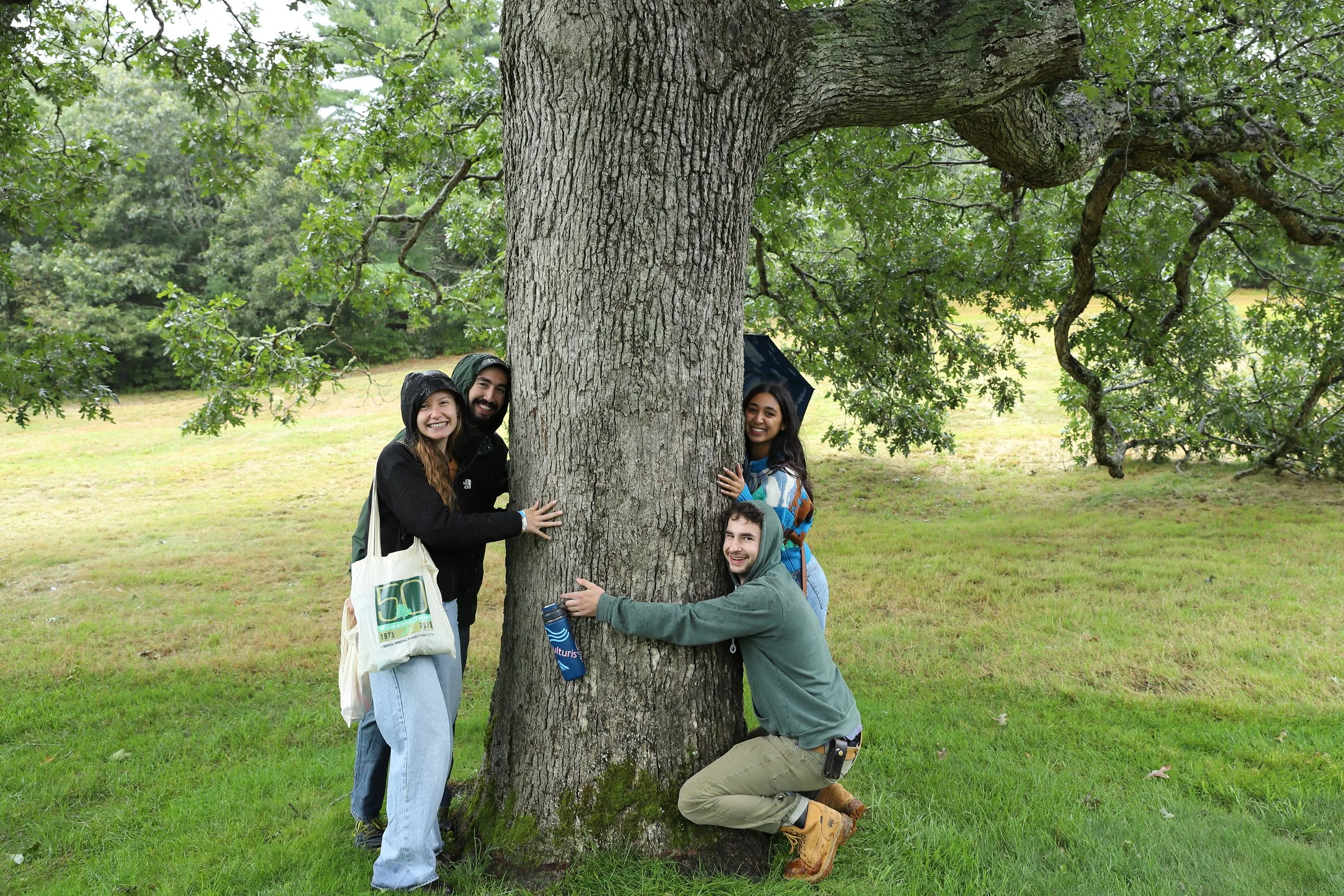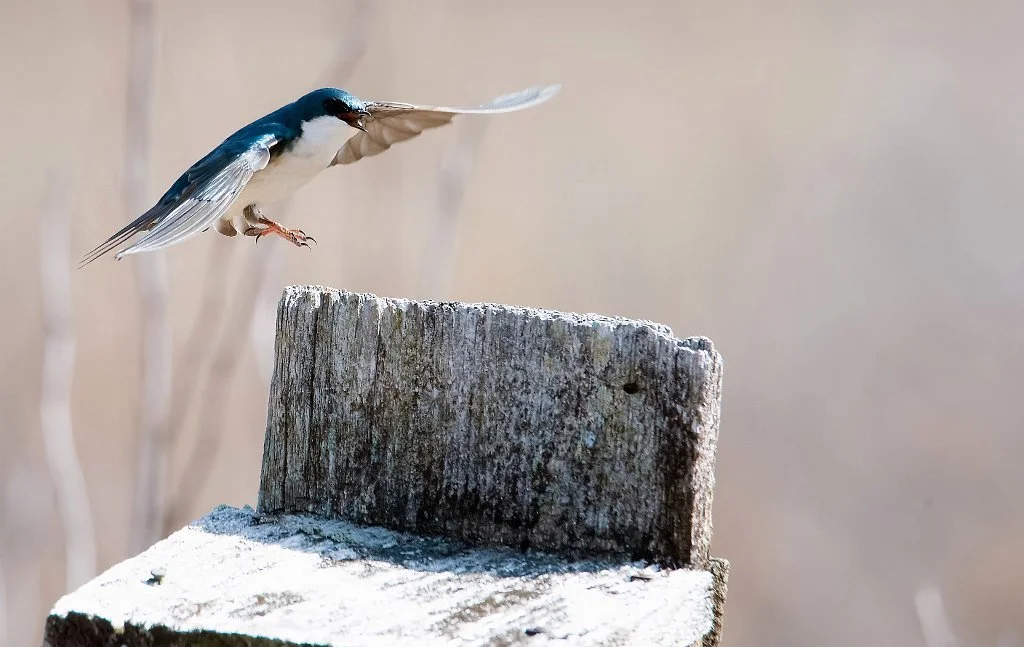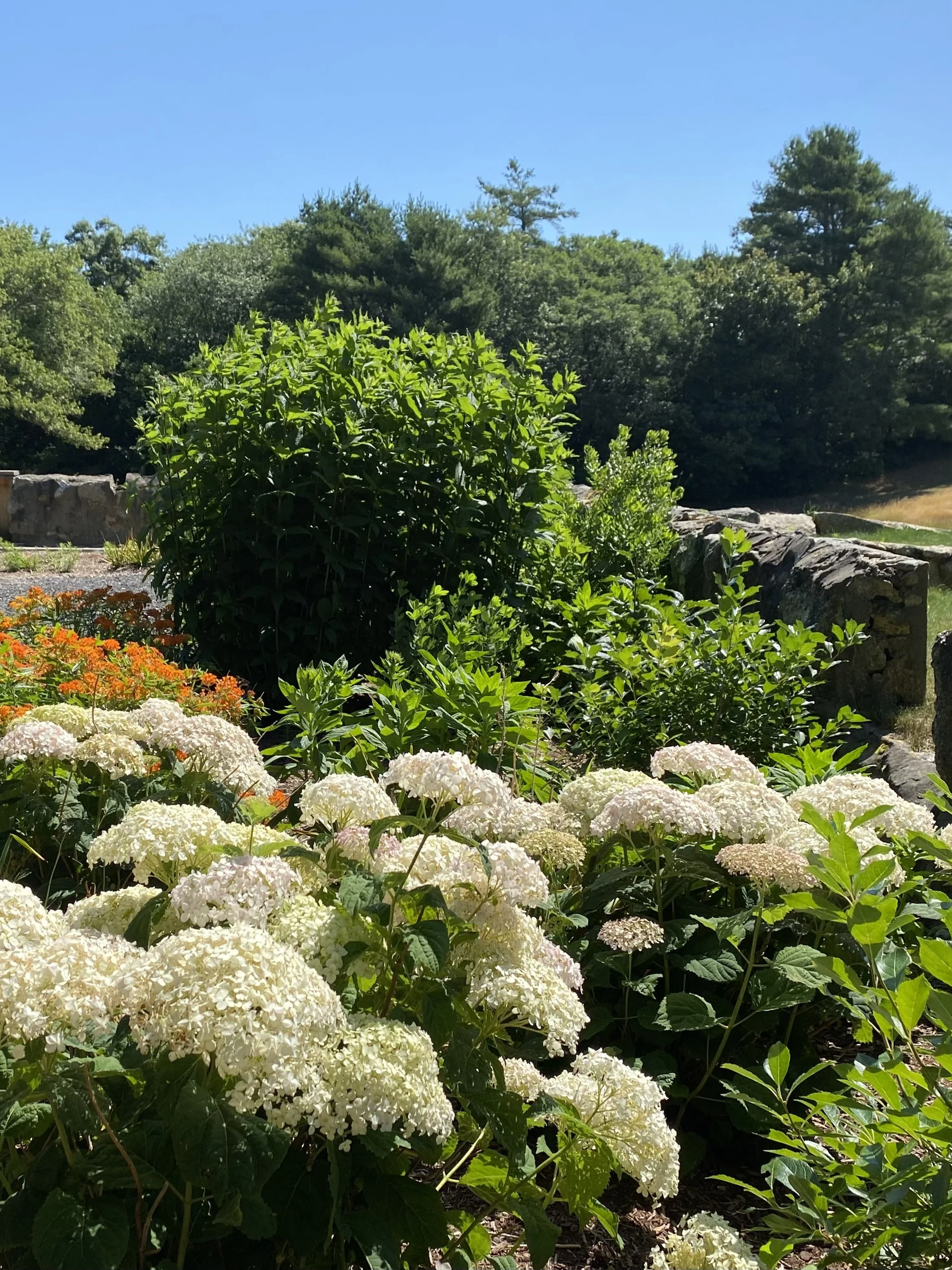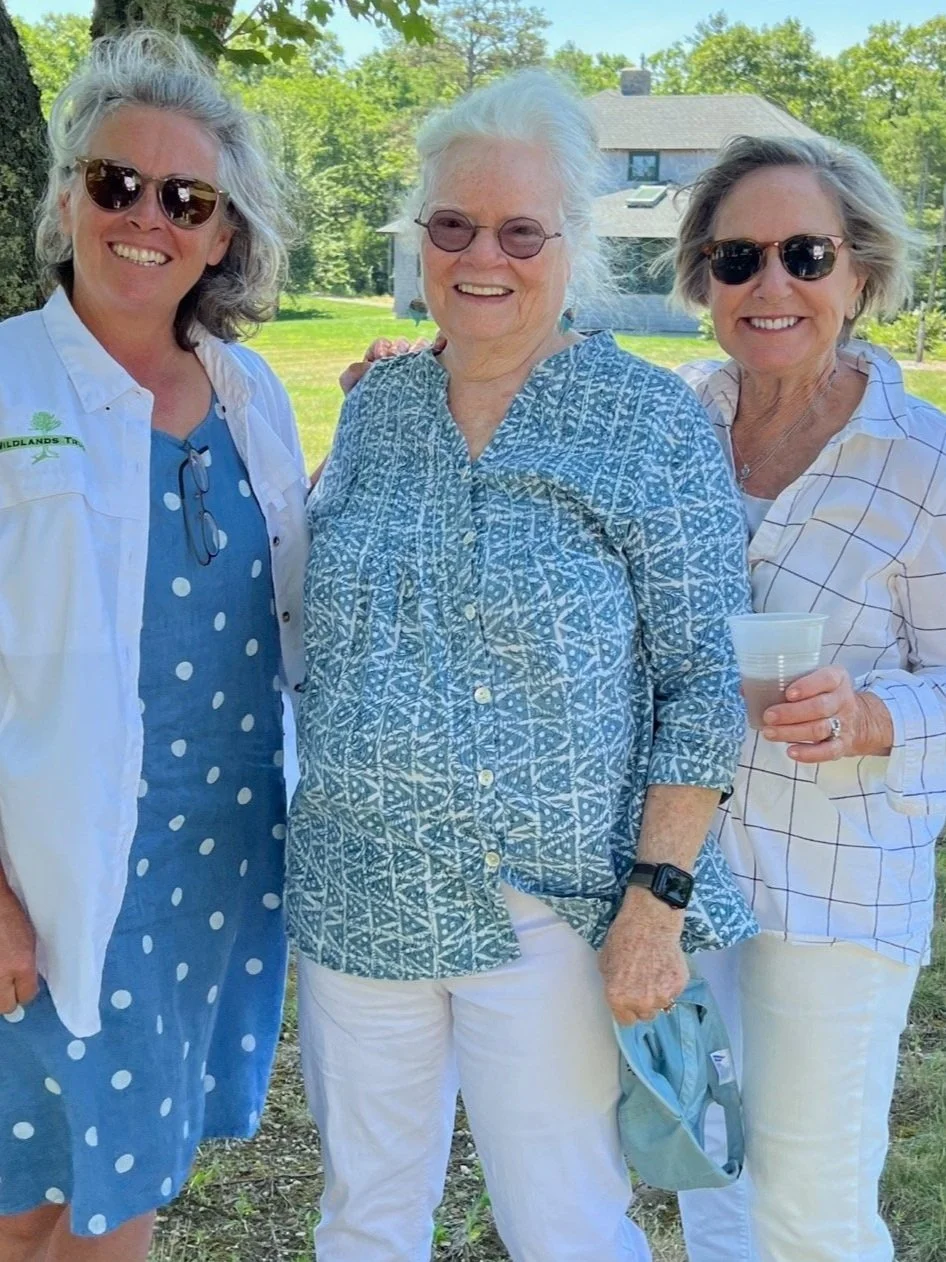What’s New at Wildlands
Leaders for Land: Wildlands Launches Corporate Giving Program
Making the Business Case for Saving Land For Everyone, Forever
Paula and Bill Harris, co-founders of WH Cornerstone, joined Leaders for Land to support the maintenance of Wildlands Trust’s headquarters, Davis-Douglas Farm in Plymouth.
Many forward-looking businesses today identify conservation as a core value. Business leaders with this mindset see land stewardship as a strategic investment—a way to fulfill their brand promise and build a stronger connection with their communities. This mindset inspired Wildlands Trust’s exciting new corporate partnership program, Leaders for Land.
Leaders for Land allows mission-driven businesses to make a lasting impact on local and regional communities by investing in the care of a public preserve in Wildlands’ growing portfolio of protected land across Southeastern Massachusetts. By supporting Wildlands, businesses elevate their profile and demonstrate leadership in their commitment to protecting our region’s natural resources for generations to come.
“A clear trend shows that customers, employees, suppliers, and all other business stakeholders favor conservation-conscious investments in the community and in this region we call home,” Donor Relations Manager Rob Kluin said. “Wildlands’ mission is relevant to everyone, and in a world so often divided, it’s heartening to see how that leads us to common ground.”
To learn more about Leaders for Land, visit wildlandstrust.org/corporate or contact Rob Kluin, Donor Relations Manager, at rkluin@wildlandstrust.org.
Leaders for Land Spotlight: WH Cornerstone Investments
Based in Duxbury, WH Cornerstone Investments is a trusted financial planning and investment advisory firm with over four decades of experience helping clients build wealth and secure a strong financial future. At WH Cornerstone, financial planning is about more than crunching numbers; it’s about empowering clients to navigate life’s unexpected curveballs with confidence.
WH Cornerstone Investments appreciates the value and purpose of Leaders for Land and made the decision to come aboard with a multi-year commitment.
“I first connected with Wildlands Trust over 20 years ago when I served on the Duxbury Open Space Committee, working to preserve the Historic O’Neil Farm,” said Paula Harris, co-founder of WH Cornerstone Investments. “We love the work Wildlands Trust is doing to protect our land and connect people with nature. Supporting their mission feels so natural to us. It aligns with our values.”
Wildlands is grateful for WH Cornerstone’s pioneering support as our inaugural Leader for Land.
Solstice Celebration: Let’s Show Up for the Region’s Lands and Waters
Attendees of Wildlands Trust’s 50th Anniversary Celebration in 2023 embrace the ancient white oak tree at Davis-Douglas Farm in South Plymouth. (Photo by Paul Carey)
By Thomas Patti, Communications Coordinator
(This piece first appeared in the Plymouth Independent.)
For a bird lover like me, the view from my office window is a blessing and a curse. A blessing because the full diversity of avian life on the South Shore—warblers and waxwings, hummingbirds and hawks, bluebirds and bald eagles—visits with enough regularity to call them coworkers. A curse because these coworkers are highly distracting, with flagrant disregard for the rhythms of a nine-to-five workday.
Luckily, I work for Wildlands Trust, a nonprofit organization with sympathy for those who wander. Founded in 1973, Wildlands Trust is one of the state’s oldest and largest land trusts, protecting and stewarding the natural places that make Southeastern Massachusetts a remarkable place to live, work, and play. Our headquarters at Davis-Douglas Farm is a hidden gem tucked within a vast expanse of globally rare forest and pond habitats in South Plymouth. Outside my window, a pollinator garden, wildflower meadow, and secluded woodland converge to form a hotspot of natural beauty, punctuated by the iconic water tower on Long Pond Road.
If you visit Davis-Douglas Farm this spring, the first birds you’ll likely see (but certainly not the last) are tree swallows. The iridescent blue backs of these sparrow-sized songbirds will catch the sunlight and your eye as they bank, swoop, glide, twist, and turn in flocks of dozens over the wildflower meadow, snapping up insects on the wing. Catching enough bugs to fuel their acrobatic frenzy is a full-time job. In fact, they rarely seem to land.
A tree swallow landing on a nest box. (Photo by Rob MacDonald)
Sometimes, the social and environmental challenges of our time can feel like those tree swallows, swirling in our minds and clamoring incessantly for our attention. In the news and on social media, rage, despair, and misinformation startle our anxieties up to the sky and offer them no place to land—no way to stand up for our beliefs, defend our values, or effect positive change.
On the issue of the environment, Wildlands Trust is a place to land. We know that most people don’t have the time to take the preservation of our region’s natural health and beauty into their own hands. But we also know that most people share our vision for the future of Southeastern Massachusetts. A resounding majority of Americans, regardless of political affiliation, support the expansion of natural climate solutions, such as protecting forests and restoring coastal wetlands. In Massachusetts, a national leader in environmental protection, over two-thirds of residents think we need to do even more to conserve land, water, and wildlife habitat.
With such broad public support for conservation, the accelerating loss of natural land across the state and country can make grassroots efforts feel hopeless. It's true that we face an uphill battle. Far too often, the fate of our beloved lands and waters is decided behind closed doors, at tables where money determines the size of your seat and the volume of your microphone.
Wildlands Trust is your chair at those tables. It may be a lawn chair. But with 52 years of experience serving 59 cities and towns, Wildlands Trust knows how to leverage every dollar and every show of support into a case for nature that money can’t buy off. The more members we represent, the better our case. Together, our voices are too loud and our vision is too strong to ignore.
On Saturday, June 21, the Wildlands Trust Solstice Celebration at Davis-Douglas Farm will have something for everyone—music, food, hikes, crafts, raffles, and more. It will also serve as an undeniable testament to the size and strength of the regional conservation community. Let's come together to make a resounding statement that nature is non-negotiable in the future of our region. Whether you're a longtime member or just now learning about Wildlands Trust, here is your chance to show up for the lands and waters of Southeastern Massachusetts—and celebrate the start of summer with family, friends, and neighbors.
When the tree swallows of Davis-Douglas Farm finally run out of steam, they find refuge in a row of bird boxes on the meadow’s edge. Here, they escape the heat, rest their wings, and tend to the next generation. Later this month, people across the region will descend on Davis-Douglas Farm to do the same. Wildlands Trust can’t help with all the worries flying around your head. But your passion for the natural world is safe with us.
Waddling Out of 2022
By Rachel Bruce, Director of Special Projects
There is much to reflect on and be grateful for this year as it comes to a close. Not least of all was the triumphant return of our annual Post Feast Waddle on Friday, November 25. Our cry to opt outside on Black Friday was heard, and nearly 40 people gathered at Wildlands Trust to take a walk in the woods with us.
The morning was gloomy with the threat of rain constantly looming, but that didn’t stop dozens of people and their dogs and families from helping make our 7th Annual Post Feast Waddle one to remember. Since its beginning in 2016, this program has always been a popular way to “skip the shopping lines and line the trails.” However, Covid in 2020 and then downpours in 2021 brought the momentum for this walk to a screeching halt. With Covid and rain still looming over us this year, we were not sure what to expect, but our community showed up.
We had a great time hiking and chatting about our trails and mission with everyone who came, including the many who had never been to Wildlands before. Along with our regular monthly hikes and a few key events including Spring Opening Day in May, programs this year have provided us with both fond memories and new momentum for 2023.
Native Plant Garden in Plymouth Dedicated to Deborah Wood Davis
Read Time: 3 min
By Amy Markarian, Senior Copywriter
On Saturday, July 9, at 10:30am, before the morning sun invited summer’s characteristic heat and humidity, approximately 70 community members gathered at Wildlands Trust’s headquarters on Long Pond Road to dedicate the property’s native plant garden to a longtime supporter of the Trust’s mission, Deborah Wood Davis.
Deborah Wood Davis married into the family of Howland Davis, the previous owner of the land that is now Wildlands’ Davis-Douglas Conservation Area. Her family recalls Deborah’s great affection for the area and, according to her daughter Caroline Chapin, she was excited by Wildlands’ mission and the way it drew the community together. So, when Deborah’s five daughters were looking for a way to honor their mother and the strong roots and connections she had established here, they came to Wildlands Trust.
Sarah Geer, one of those daughters, approached Wildlands’ President and Executive Director Karen Grey to discuss the idea at just the right time. Wildlands had been struggling with the desire to maintain some component of the property’s historic barn, but its crumbling foundation walls and the steep drop from ground level to its interior depth posed hazards that had to be addressed. Simultaneously, local landscape architect Love Howard had also reached out to Karen with the idea of designing a pollinator-friendly garden using native plant species that would support the local ecosystem, and she was looking for a location where she could bring the idea to life. The Davis family’s gift to honor their mother provided the needed support to begin the process of converting the unsafe barn foundation into a showcase garden and educational tool at Wildlands’ headquarters.
The project, according to Karen, “brought together need with opportunity and allowed us to make meaningful connections for people, which are always the best type of projects.” In the fall of 2020, after structural work was completed, the first plants were added by a group of volunteers—including some of Deborah’s daughters, Wildlands volunteer and Board Member Marilynn Atterbury, and others—under Love’s guidance. Today, Marilynn continues the work, along with Wildlands’ gardener Kim Goggin, carefully maintaining and enhancing what is often called “the foundation garden.”
On the morning of the dedication ceremony, the gardening team’s hard work and meticulous care were on full display for the large crowd that had assembled for the occasion. In what would have been Deborah Davis’ 100th year, according to Caroline, the family organized a mini reunion around the dedication ceremony, bringing all five daughters, spouses, children, and almost all of the grandchildren and great-grandchildren together in Plymouth—a gathering of community that would likely have brought the family’s matriarch great pleasure. Also in attendance were several of Wildlands’ staff members, Board members, and supporters. Karen Grey addressed the group with gratitude for all who contributed to the project, Sarah Geer shared reflections of her mother, and Love Howard described her inspiration and plan for the garden’s creation. As the ceremony concluded, with a comfortable breeze under bright blue sky, the flitting of bees and butterflies entertained visitors as they reminisced and explored the newly dedicated Deborah Wood Davis Native Plant Garden.
Wildlands' Community Welcomed Back at Opening Day 2022
Read Time: 2 min
By Amy Markarian, Senior Copywriter
On May 1, the Wildlands community came together at our Davis-Douglas Farm headquarters, in Plymouth, to kick off the 2022 programming season. Near-perfect spring weather was a bonus for all who attended our Opening Day celebration, making for a fun and relaxing Sunday afternoon that surely left many visitors daydreaming of the summer days ahead!
Friends of all ages, people and pets, families, returning members, staff, volunteers, and first-time visitors enjoyed local beer and live music on the lawn, explored craft activities and games, and learned all about the Wildlands Trust community, the work we're doing, and the various opportunities to join us--at our programs and events, as volunteers, and through membership.
The Conservation Barn was open for visitors to peruse information tables about current offerings and initiatives at Wildlands, or to purchase soft pretzels, fresh out of the oven. Many visitors enjoyed lengthy conversations with our staff and volunteers inside the Barn, while some of our youngest visitors dropped in just long enough to find the lollipops that adorned the display areas.
Wildlands’ Programming and Outreach Manager Claire Johnston said, “We are thrilled to have people interested in learning about us, what we’ve been doing, and what’s to come!” And our entire staff loved seeing all of the smiling faces and the steady buzz of activity around our headquarters that day. We can't wait to keep the momentum going as our 2022 programming season gets underway, so be on the lookout for more fabulous events to come!



























